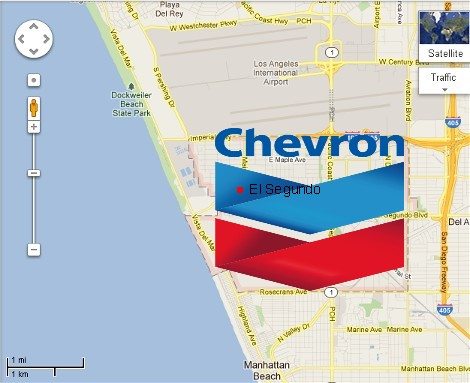

Sometimes a simple statement can provide a window onto a worldview; in this case, the arrogance of privilege.
The City of El Segundo, home to a huge Chevron refinery, is considering raising the oil giant’s taxes to help meet the demands of a growing town. Refineries around the state pay far higher taxes to their local governments than Chevron does. The proposal would bring Chevron in line with its competitors and in line with a common sense definition of fairness.
Chevron, of course, wants to hold on to its growing profits and is fighting hard against any tax increase. It is doing the same at its Richmond, California refinery. In 2011, the company asked Contra Costa County to lower its assessed property value from $1.8 billion in 2007 and $1.15 billion in 2008. Contra Costa assessed the property value at $3 billion. If an appeals board rules in Chevron’s favor,


It’s been a busy, contentious couple of weeks on the economic front. As part of an ongoing series of conversations about the economy, politics and the future of Los Angeles, Frying Pan News asked USC Professor and economist Manuel Pastor to separate the good, the bad and the ugly.
Frying Pan News: Did President Obama’s State of the Union speech reclaim his status as a progressive populist?
Manuel Pastor: It certainly seems that he has his mojo back. This speech was one of the first times he was able to frame what he is doing in a way that makes sense. One element of the speech that was important was the concept that success come from teamwork, wrapping the idea of interdependency into the national narrative. The second thing is he was very clear that concerns about inequality do not stem from people begrudging others’ economic success;
» Read more about: The Economic Café: Beutner, Caruso and Obama’s New Mojo »
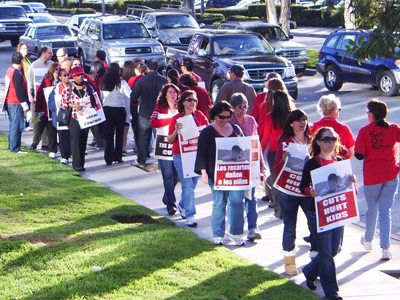

By Mark Naison
(Note: Mark Naison’s post appeared earlier this month on L.A. Progressive and With a Brooklyn Accent.)
In preparation for my course, The Worker in American Life, I am reading about the broad-based assault on industrial labor that took place during the 1980 and ’90s in a broad swath of the United States from New England through the Pacific Northwest.
Plant closings, transfer of family businesses to international conglomerates, union busting, and finally, the destruction of a wage scale and union rules that allowed factory workers to live in comfort and security and have dignity on the job hit the nation with the force of a juggernaut. In industrial cities, and in small towns which depended on industrial production, the results were devastating. These communities where then beset by a host of social ills – drug epidemics,
» Read more about: Teachers, Government Workers on the Chopping Block — Again »


Many of us love Los Angeles, but few get paid to love it. Los Angeles magazine editor-in-chief Mary Melton is one of the lucky few. Since taking over as editor in 2009 (she had been executive editor since 2002), Melton has continued to push the publication beyond its former Westside comfort zone into the far corners of our megalopolis.
A native Angeleno, Melton – whose great-grandmother came to L.A in 1918 to escape the stifling constraints of her upper-crust Midwest family – went to Hollywood High and worked for years at the L.A. Weekly and the L.A. Times before coming over to Los Angeles magazine. She rides the bus from Eagle Rock to work when she can, and thinks every public official should be required to do the same at least once a week. This is hardly Melton’s only civic improvement idea —
» Read more about: Los Angeles Magazine’s Mary Melton on What’s Wrong With the Times »


(A somewhat longer version of this post by Michele Simon appeared January 17 on Food Safety News. Reposted here with author’s permission.)
Having saturated the rural landscape, shuttering local stores in small town America along the way, now, in the wake of stagnant sales and increased competition, Walmart desperately needs to expand into urban markets.
And what better urban market than one full of eight million people? While the big box retailer is eager to enter the Big Apple, challenges loom large. Given the negative reputation Walmart has earned for being hostile to workers among other problems, many New Yorkers are skeptical, to put it mildly.
To counter the opposition, Walmart is positioning itself as the solution to urban food deserts – areas where finding real food is next to impossible. But as Anna Lappé has eloquently argued,
» Read more about: Is Walmart's March into Cities Helping or Hurting? »


(Note: Phaedra Ellis-Lamkins’ post first appeared yesterday on Green for All.)
America is not used to playing catch-up, not since World War II. We’ve built a massive, unparalleled economy through an always-evolving blend of entrepreneurship, public and private investment, and innovation.
We still lead the rest of the world, but we’ve slowed. Stumbled. Meanwhile our competitors are picking up speed – particularly in key sectors that promise long-term growth.
President Obama is presenting his [third] State of the Union address tonight, at the outset of a year that will culminate with a fiercely contested battle for his position. It may be the President’s last opportunity to establish the agenda that America needs in order to be competitive over the long term – while putting people to work immediately.
It is a moment for boldness – a time at which the President can outline a plan of action that shifts America’s focus to the future,
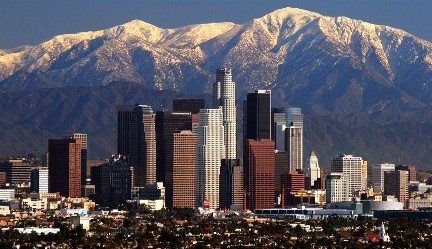

On December 29, 2011 the State Supreme Court dealt California’s 400 redevelopment agencies an unanticipated death blow. This includes the Los Angeles Community Redevelopment Agency, where I have served as a commissioner since 2002. Based on the court’s decision and the legislation that eliminated redevelopment agencies in California, the L.A. CRA and all other agencies will shut their doors on February 1, 2012.
The demise of redevelopment agencies, however, does not mean that we have to abandon the noble and necessary goal of public investment in distressed communities. To do so would punish those most in need and make it virtually impossible to address the poverty and unemployment currently faced by millions of Californians.
It is now up to the state legislature to act quickly to give cities a new tool to create good jobs, affordable housing and more sustainable communities. Here are three steps the legislature and Governor Jerry Brown can take to make this a reality.
» Read more about: After Redevelopment: Creating Real Investment in Our Cities »
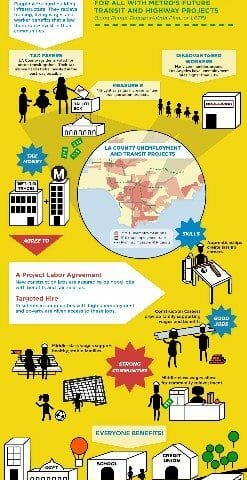
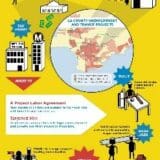
Can government play a critical role in the creation of good jobs, and target those jobs for economically distressed communities?
Skeptics should look carefully at Construction Careers, a nationally proven tool pioneered in Los Angeles that could bring more than a quarter-million good jobs and up to $72 billion to the local economy.
The L.A. coalition supporting Construction Careers – a policy that combines wage, benefit, and safety standards with hiring requirements for impoverished communities – is asking the Metropolitan Transit Authority (MTA) to adopt such an agency-wide policy for its Long Range Transportation Plan, which includes several major transit and highway projects. The vote will be Thursday, January 26 at the MTA Board meeting.
Construction Careers policies have already been successfully adopted and implemented locally by the Exposition Light Rail Phase 2 project, the Port of Los Angeles and the Department of Public Works, among other agencies.
Here is a visual guide to how the Construction Careers policy at the MTA would bring real benefits to the region.
» Read more about: Accelerating the Recovery: The Economic Promise of Construction Careers »


 On October 12, 2011, in Lamont, California, Armando and Eladio Ramirez went into a composting drainage pipe, wearing only painters’ masks for protection – and breathed in fatal amounts of hydrogen sulfide. Armando, 16 years old, went in first to clean out the pipe, and died almost immediately; Eladio, 22, went in after his brother to help him, and was rendered brain dead, dying the next day.
On October 12, 2011, in Lamont, California, Armando and Eladio Ramirez went into a composting drainage pipe, wearing only painters’ masks for protection – and breathed in fatal amounts of hydrogen sulfide. Armando, 16 years old, went in first to clean out the pipe, and died almost immediately; Eladio, 22, went in after his brother to help him, and was rendered brain dead, dying the next day.
These deaths happened at a green waste processing facility run by Crown Disposal Services – a prominent player in L.A.’s commercial waste and recycling market – and are being investigated by Cal-OSHA, the CA Department of Labor and the United States Department of Labor.
Several weeks after Armando’s and Eladio’s deaths, a group of recycling sorters, waste hauling drivers and helpers filed a formal complaint with Cal-OSHA, chronicling a litany of severe health and safety violations taking place at American Reclamation,
» Read more about: Death and the Waste Industry: A Call for Action »